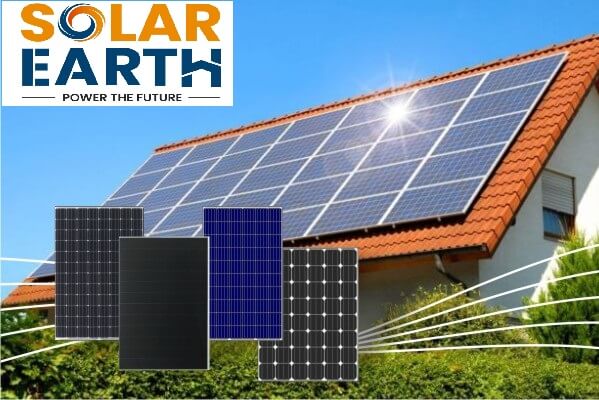Introduction to Residential Solar Panels in India
In India, where electricity bills seem to rise every year and power cuts are still a common challenge in many regions, solar energy has become more than just an alternative, it’s a necessity. For Indian households, switching to photovoltaic (PV) solar panels is one of the smartest decisions to reduce electricity bills, ensure reliable power, and contribute to a greener environment.
India enjoys abundant sunshine, with most regions receiving over 300 sunny days a year. This makes it an ideal country for residential solar installations. By installing solar panels, Indian families can enjoy long-term savings, reliable power during outages, and the pride of moving toward energy independence.
Why Should Indian Homes Choose Photovoltaic Panels?
Environmental Benefits
India is one of the world’s largest energy consumers, and much of that demand is still met by coal and other fossil fuels. By installing solar PV panels, households can reduce their carbon footprint and play a role in fighting climate change. Every unit of solar power generated means less pollution in our cities and cleaner air for our children.
Financial Savings
Electricity tariffs in cities like Mumbai, Delhi, and Bangalore are among the highest in Asia. A properly sized solar system can cut electricity bills by 60–90%. Over 25 years, this translates to lakhs of rupees in savings.
Reliable Power Backup
Many parts of India, especially in Tier-2 and Tier-3 cities, face frequent power cuts. With a solar panel system and battery backup, households can enjoy uninterrupted power supply, even when the grid goes down.
How Do Photovoltaic Panels Work?
Solar panels might look simple, but they’re built on a fascinating science. Each panel is made up of solar cells that convert sunlight into electricity through the photovoltaic effect.
- The panels generate direct current (DC).
- An inverter converts this DC into alternating current (AC), which powers your home appliances.
- Excess energy can be stored in a solar battery or sent back to the grid under net metering policies, earning credits on your bill.
This means your rooftop is not just a shelter anymore, it becomes a mini power plant!
Key Factors for Indian Buyers Before Choosing Solar Panels

Efficiency Ratings
Efficiency decides how much sunlight is converted into electricity. In India, where rooftop space is often limited in cities, choosing high-efficiency panels (20–23%) ensures maximum output even in smaller areas.
Durability and Warranty
With Indian weather ranging from scorching heat in Rajasthan to heavy monsoons in Kerala, durability matters. Look for panels that come with a 25-year performance warranty and strong build quality.
Price vs. Value
Indian buyers are cost-conscious, but cheap panels don’t always mean good savings. A slightly higher investment in premium panels can pay back in the long run through better performance and lower maintenance.
Installation and Space
In urban homes with limited rooftops, high-efficiency panels are ideal. For larger homes or farmhouses with more space, value panels may be more practical.
Top 10 Best Photovoltaic Panels for Indian Homes
SunPower Maxeon 6
Known worldwide for its highest efficiency (22.8%), SunPower panels are perfect for Indian families with small rooftops who still want maximum power.
Panasonic EverVolt
Great for India’s hot climate, Panasonic panels maintain performance even in high temperatures—a big plus for cities like Delhi, Hyderabad, and Chennai.
Canadian Solar HiKu Series
Popular in India for their affordability and good efficiency. They strike a balance between cost and performance, making them a strong option for budget-conscious buyers.
Trina Solar Vertex S
A leading choice in the Indian market, offering durable design and efficiency around 21%. Widely used in both residential and commercial projects.
REC Alpha Pure
Eco-friendly and high-performing, REC panels are gaining traction in India among premium buyers who value sustainability.
Q Cells Q.Peak Duo
Q Cells panels are versatile and well-suited for Indian conditions. Their half-cell technology ensures better performance during partial shading—a common issue in Indian rooftops.
JA Solar DeepBlue Series
Affordable yet reliable, JA Solar panels are a good match for middle-class families looking for efficiency without a hefty price tag.
Jinko Solar Tiger Neo
With advanced n-type cell technology, Jinko panels deliver steady performance. They’re becoming increasingly popular in metro cities.
LONGi Hi-MO 5
LONGi panels are among the best-selling in India, offering durability and affordability. Ideal for homeowners looking for long-term value.
Vikram Solar Panels (India’s Pride)
Vikram Solar, an Indian manufacturer, offers panels designed specifically for local weather conditions. Their quality and affordability make them a top choice for patriotic buyers who want “Made in India” products.
Comparing the Best Residential Solar Panels in India
| Brand/Model | Efficiency (%) | Warranty (Years) | Best For |
| SunPower Maxeon 6 | 22.8 | 40 | Premium buyers with limited space |
| Panasonic EverVolt | 21.7 | 25 | Hot climates |
| Canadian Solar HiKu | 21.3 | 25 | Value for money |
| Trina Solar Vertex S | 21.0 | 25 | Widely available in India |
| REC Alpha Pure | 21.9 | 25 | Eco-conscious buyers |
| Q Cells Q.Peak Duo | 20.9 | 25 | Shaded rooftops |
| JA Solar DeepBlue | 21.1 | 25 | Budget-friendly |
| Jinko Solar Tiger Neo | 22.0 | 25 | High-tech option |
| LONGi Hi-MO 5 | 21.2 | 25 | Balanced performance |
| Vikram Solar Panels | 20.5 | 25 | Proudly Indian homes |
Cost of Installing Solar Panels in India
Average Cost
In India, the cost of residential solar panel installation is between ₹45,000 and ₹60,000 per kW. For a typical 5kW system, this comes to about ₹2.5–3 lakh.
Subsidies and Government Support
The Indian government actively promotes solar adoption through the Rooftop Solar Subsidy Scheme, offering up to 40% subsidy for residential installations. State governments like Gujarat, Maharashtra, and Kerala also provide additional incentives.
(Reference: MNRE – Ministry of New and Renewable Energy)
FAQs on Residential Photovoltaic Panels in India
What are photovoltaic panels?
They are solar panels that convert sunlight into usable electricity for your home.
How long do solar panels last in Indian conditions?
High-quality panels last 25 years or more, even under extreme weather.
Are photovoltaic panels suitable for small Indian rooftops?
Yes. High-efficiency panels are designed to deliver maximum output in limited space.
How many panels are required for a 5kW solar system?
Depending on the efficiency, a 5kW system may need 12–15 panels.
What maintenance is required?
Minimal. Occasional cleaning to remove dust and regular inspections keep them running smoothly.
Will panels work during monsoon or cloudy days?
Yes, though output is lower. They still generate power from diffused sunlight.
Conclusion – Choosing the Right Solar Panel for Your Indian Home
India is blessed with sunshine, and every rooftop has the potential to generate power. From premium brands like SunPower to homegrown heroes like Vikram Solar, there are options for every budget and need.
The decision should be based on your rooftop size, budget, and long-term energy needs. With government subsidies, falling costs, and proven durability, residential solar panels in India are no longer a luxury, they’re a smart investment for your family’s future. Whether you’re living in a metro city or a small town, installing solar panels means lower bills, uninterrupted power, and a cleaner tomorrow.



